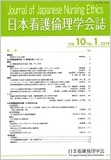Japanese
English
- 販売していません
- Abstract 文献概要
- 参考文献 Reference
- サイト内被引用 Cited by
本研究は、臨床看護師の倫理的問題の体験と教育の機会や知識の認知度を病院の規模別に明らかにした。大規模(301床以上)と中小規模(300床以下)病院に就業する看護師230人を対象とし、「ETHICS and HUMAN RIGHTS in NURSING PRACTICE」の日本語版に独自の項目を加えた質問紙で回答を得た。大規模病院が中小規模病院より倫理的問題の体験が多く、「インフォームドコンセントの有無」、「患者の権利と尊厳の尊重」、「どこから死とするか」、「個人的・宗教的価値に反して行動する」、「健康に危険の及ぶ可能性のある患者のケア」が有意に多く体験していた。教育の機会は大規模病院が多く、用語の理解の認知度や教育の必要性、倫理の関心度も大規模病院が高かった。教育の機会があると、知識だけでなく関心も高くなり、倫理的問題を捉えやすくなる。倫理的感受性を含めた教育内容の充実が必要と考える。
This study sought to clarify the educational opportunities, level of ethical knowledge, and ethical issues experienced by clinical nurses based on hospital size. Subjects were 230 nurses employed at larger(301 beds or more)and small to medium-sized(300 beds or less)hospitals. Subjects completed a questionnaire containing items from the Japanese version of “Ethics and human rights in nursing practice.” The results showed that nurses in larger sized hospitals were more experienced in tackling ethical issues, with significantly greater experience with reference to “respecting/not respecting informed consent,” “respect for the patient's rights and dignity,” “determining when death occurs,” “acting against personal/religious values,” and “patient care with a possible risk for health” as compared to nurses in small to medium sized hospitals. Larger hospitals presented more educational opportunities regarding ethics, and level of recognition of the understanding of the terminology and importance of ethics education. Furthermore, the level of interest in ethics was higher in larger hospitals. With more educational opportunities, there was an increased interest in the theoretical knowledge of ethics and it was easier to perceive ethical issues. It is necessary to enhance the educational content in order to heighten nurses' sensitivity to ethical issues.
Copyright © 2018, The Japan Nursing Ethics Associatin. All rights reserved.


